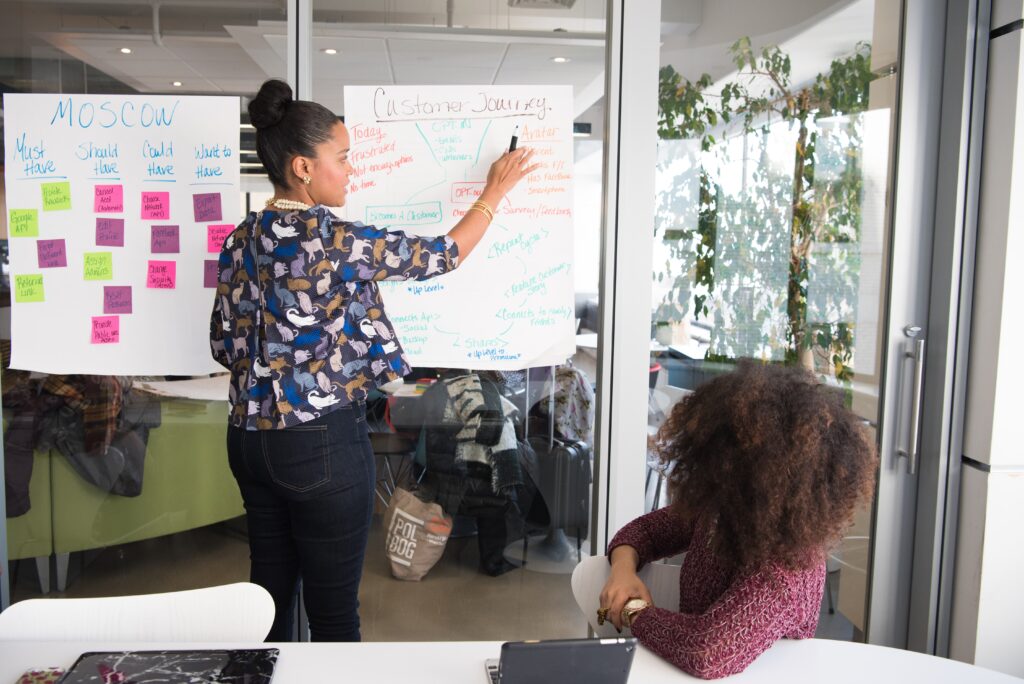Maximising Team Performance with Team Coaching: Explaining Its Role in Changing Team Dynamics and Driving Collaborative Success
Welcome to our blog, where we explore the transformative power of team coaching in unlocking …

Welcome to our blog, where we explore the transformative power of team coaching in unlocking …
Imagine a team where innovative ideas are lost in endless planning, strategic plans never get …
All organisations are constantly searching for reliable methods to enhance performance and boost productivity. As …
Ah LEGO, that familiar old toy with the colourful bricks. It probably provided you with …
You probably already have a general idea of the importance of team alignment in a …
Have you ever wondered how to create a team vision statement to map out your …
In our last article we examined the difference between a vision statement and mission statement. …
For the last few months, our blog posts have focused on how you can improve …
Are you new to a leadership role? Well worry not, we have seven tips to …
In the world of business, leadership is one of the most important components to creating …
The chance is that if you are interested in this series, you are probably already in a leadership position within your organisation or just about to enter one and if so, congratulations on this achievement! However, let’s suppose you haven’t made it that far yet; maybe you’re new to an organisation or haven’t considered a leadership role until now. Well, whatever stage you are at, this series is designed to help you consolidate your knowledge and show you how you can improve leadership skills and boost employee engagement in your role.
Following on from our article on avoiding discontent in the workplace, in this first article of a new series we will be talking about the cognitive abilities that can help with team facilitation. These skills are ones you will also need to develop when taking a leadership role within a company or organisation. The second article of this series will look into the leadership styles that you can adopt in order to lead an effective team meeting. The third will be about leadership profiling, where you learn more about your strengths and weaknesses as an individual in a leadership role. Finally, we will discuss tips and tricks to help you maintain a healthy and happy leadership role with those around you.
A smoothly operating organisation doesn’t happen overnight. Instead, it is a work in progress that requires strong leadership and talent at its core, as well as continuous honing with things like strategy workshops or communication skills workshops. A good leader can attract, retain, build, and inspire talent within their office and is responsible for creating and upholding the company vision, mission, and goals. Still, to be an effective leader you must build a rapport and emotional connection with your team, a skill that requires a cognitive ability known as emotional intelligence.

So, what is emotional intelligence? Well, Oxford Languages describes it as “the capacity to be aware of, control, and express one’s emotions, and to handle interpersonal relationships judiciously and empathetically. Emotional intelligence is the key to both personal and professional success.”
In other words, emotional intelligence is the ability to understand, use, and manage your emotions in positive ways. For instance, a good leader will most likely relieve stress, communicate effectively, empathise with employees, and overcome challenges or defuse conflicts within their team.
According to Daniel Goleman, emotional intelligence is one of the first and single most important parts of any leadership role. You need emotional intelligence to ensure that your team believes in the company vision, listens, and follows your instructions.
There are four areas of competency in emotional intelligence:
It is essential to understand your strengths, weaknesses, and drivers, as this will help you establish clear goals that are in sync with your core values. We often talk of the company mission or company values but, for those wanting to be a good leader, these are equally important on a personal level. Therefore, self-awareness also encompasses self-reflection, understanding how your behaviour is perceived and what emotions you signal. This type of reflection helps when you are looking for areas of improvement that might benefit from external input – self-reflection can help you realise where team facilitation, communication workshops etc. could offer a different perspective. It can also prevent you from making mistakes when handling your team. For example, a leader can start with a positive and constructive approach but adjust this stance when it is no longer suitable or seems inauthentic to others.

According to Daniel Goleman, the competencies associated with self-awareness are the following:
Self-management is about controlling one’s actions, thoughts, and feelings. Managing your emotions does not mean hiding them or choosing to ignore them but choosing to react in the best way possible for the situation you are faced with. For example, a leader with good self-management does not have sudden aggressive outbursts if something goes wrong – that would significantly damage team morale and detract from the company mission. Instead, their anger will operate in a controlled fashion, with justification, at the correct place and time in a constructive manner.
The important thing to realise is that your emotions can affect your ability to lead by impacting how you feel about yourself or those around you. So often, when stress, anger, fear and frustration are left unchecked, it comes at a high price for the organisation as mistakes happen when decisions are made on impulse. Not only that, leaving your emotions unchecked could affect any attempts to increase employee engagement because it can impact your relationship with co-workers, meaning that they are less likely to engage. Of course, understanding and controlling your emotions requires quite a bit of practice, that is true of both life and business, but it is an essential skill to have, and it is never too early to start.
Some of the abilities that are part of self-management are the following:
Social awareness is the ability to read situations and respond accordingly, a vital skill for anyone trying to be a good leader. Essentially, social awareness equates to perceptiveness. Often, social awareness solicits a response that has considered the other person and communicates with them in a way that suggests the speaker intends to meet their needs. Great leaders, public speakers and team facilitators are skilled in this ability as it helps them build support. As experts in meeting facilitation, PANDEK has to use social awareness to ensure everyone engages with our methods during a facilitated workshop. Self-awareness is different to self-management as it is about understanding the feelings and emotions of others, whilst self-management is about ensuring that your response is appropriate to the situation.

According to Daniel Goleman, the competencies associated with being socially aware are the following:
The Fourth Pillar of emotional intelligence is relationship management. It relies on the three areas of emotional intelligence previously mentioned, and it is essentially about your interpersonal communication skills. Relationship management considers areas we typically associate with a leadership role like teamwork and collaboration – the type of thing that helps us to have an effective team meeting.
According to Daniel Goleman, the competencies associated with relationship management are the following:
In other words, relationship management is connecting with others in ways that enable them to feel understood and supported.
Okay, so that pretty much summarises Goleman’s theory of emotional intelligence. The above points might feel like common sense for many of you, but you would be surprised by how many organisations get caught out. In our experience, when a leadership team is experiencing a problem, one or more of these competencies are not being correctly implemented or followed. But, if you do succeed, you will gain a high-performing team and achieve better results. In this case, practice makes perfect.
Coming up next: DEFINING YOUR ROLE.
Do you know what type of leader you want to be in your business?
FOR INQUIRIES, PLEASE EMAIL US AT [email protected] OR
BOOK A FREE 30-MINUTE CONSULTATION AT HTTPS://PANDEK.ORG/.
If you would like to hear more about events, offers, blogs and newsletters CLICK HERE.
We understand that each company’s situation is unique. Tell us more about your needs and challenges and we will get back to you soon with some ideas, or book a free conversation and begin your journey.
COPYRIGHT © 2024 PANDEK GROUP LIMITED - ALL RIGHTS RESERVED - COMPANIES HOUSE - 12467210 - Operating across the UK - Based in the South West